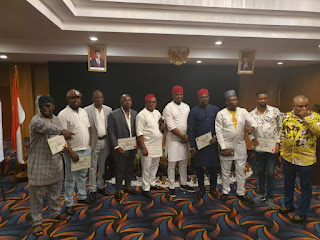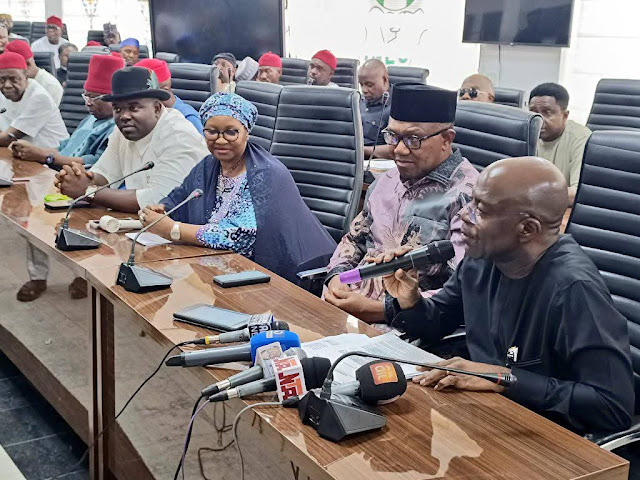Tuesday, 29 April 2025
Thursday, 10 April 2025
Labour Party Delegation Meets INEC, Submits Supreme Court Judgement on Leadership
A high-level delegation of the Labour Party (LP), led by Abia State Governor Dr. Alex Otti, today Wednesday visited the headquarters of the Independent National Electoral Commission (INEC) in Abuja to discuss key developments within the party.
During the visit, Governor Otti formally presented a Certified True Copy of the recent Supreme Court judgment concerning the party’s leadership. He noted that the meeting was aimed at fostering clarity, mutual understanding, and institutional alignment regarding the LP's current structure.
The delegation was received by INEC’s Acting Chairman, Mr. Sam Olumekun, and other National Commissioners. Both parties engaged in discussions centered on enhancing collaboration and reinforcing democratic values.
Mr. Olumekun reaffirmed the Commission’s unwavering commitment to neutrality, transparency, and the rule of law in the discharge of its constitutional responsibilities.
Wednesday, 9 April 2025
Investment Council (CWEIC) Trade and Investment Summit of 2025 on topic “AFRICA ROLE IN THE NEW GLOBAL ECONOMY
Today, in London, I had the honour of addressing the Plenary of Commonwealth Enterprise and Investment Council (CWEIC) Trade and Investment Summit of 2025 on topic “AFRICA ROLE IN THE NEW GLOBAL ECONOMY”
The discussion on Africa’s Role in the New Global Economy is a topic of immense importance considering the opportunities and endless potentials within the vast continent of Africa, which, when fully harnessed, promises a great positive impact, not just within the Commonwealth economy but globally.
The recent interventions of President Trump have disrupted some of the settled assumptions of the global economy, which has seen many countries now taking proactive and active responses to secure their economies, while the same is presently not happening in Africa.
Despite its vast opportunities, Africa’s share of global trade, according to the World Trade Organization (WTO), stands at 2-3%. Our share of the global GDP stands at about 3%. Africa’s GDP per capita is even worse at $1900 when compared to the continent in ranking – Asia, where the GDP per capita is around $9000. Africa’s global trade and GDP have been stagnant for more than 2 decades in contrast to Africa being the 2nd largest and most populous continent with a population of about 1.5 billion people. Africa is home to the most youthful and dynamic workforce with the largest concentration of working-age population of about 1 billion people.
Africa has an abundance of natural resources ranging from minerals to nearly a billion hectares of arable uncultivated land. Africa holds over 60% of the world’s arable land. Approximately 30 per cent of the world’s mineral resources are found in Africa. While Africa did not witness a similar economic transformation under globalization 2.0, we need to rise up and take the right actions to ensure that we can profit from whatever trading system will arise in the wake of the second Trump Presidency.
This Africa can achieve by simply investing in its potential – the youthful human capital of over a billion workforce it has to create the needed skilled workforce and productivity both for Africa’s and global development.
Africa’s food and agriculture market is projected to increase from its present amount of about US$280 billion a year to over US$1 trillion a year by 2030. This shows that with agriculture at the core of Africa’s economic transformation, the continent has the potential to become a global agricultural powerhouse and a net exporter of food, contributing immeasurably to the new global economy.
What is missing is the leadership that can reorder priorities and scale up productivity so that African countries can enter higher grade value creation. We have seen evidence of the possibility of higher-grade value creation in some of the better-governed African countries.
The challenge is scaling up and sustaining innovative production in the region. We need to produce more goods and services that the world needs and be smart to leverage whatever global trade arrangement survives Mr Trump’s disruption.
This is a junction for transformative change in Africa. This period requires new thinking about leadership. It requires refocusing on productivity.
Africa pursued economic convergence in the previous era by importing political and economic institutions of Western developed economics without focusing on productivity and human capital development like the developmental state of Asia.
This is the time to rebuild African economies through new leadership that focuses on rapid upgrades in productive capacities, especially innovative education and healthcare and pulling Africans out of poverty. -PO











































